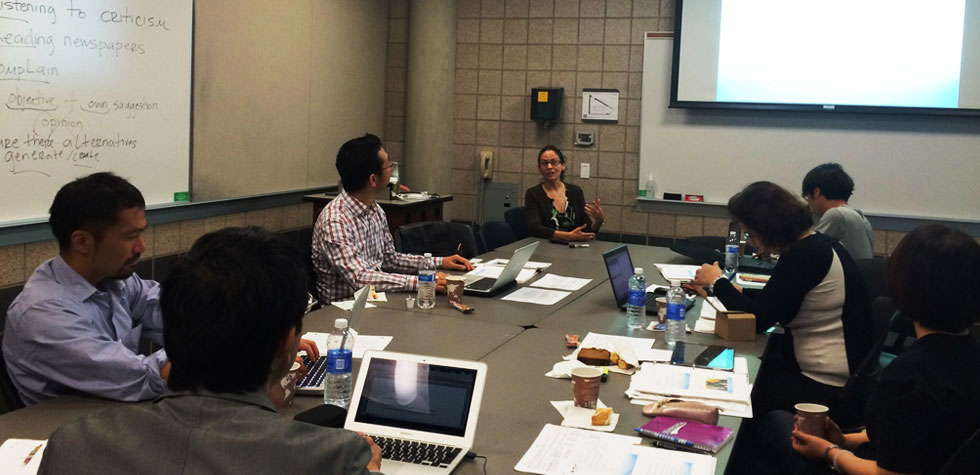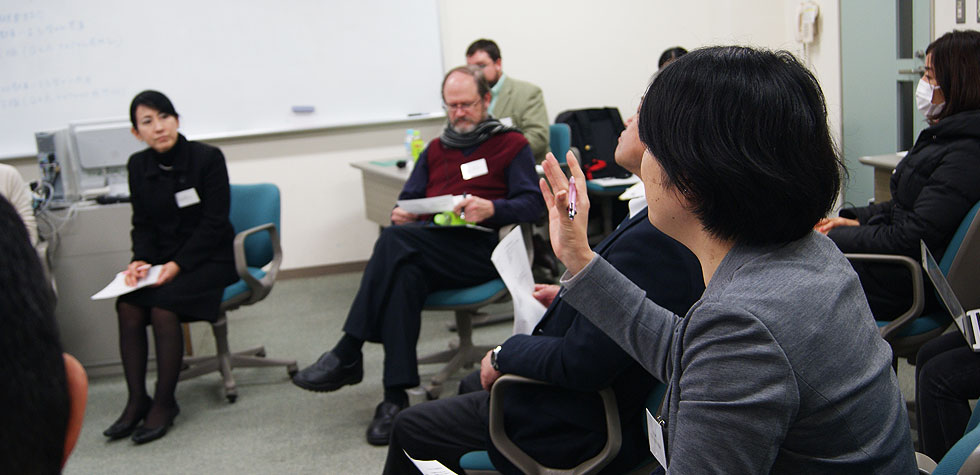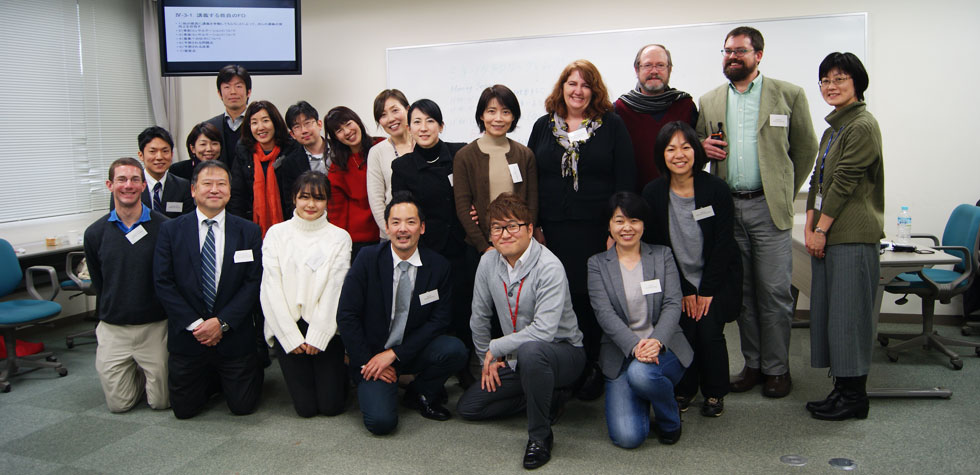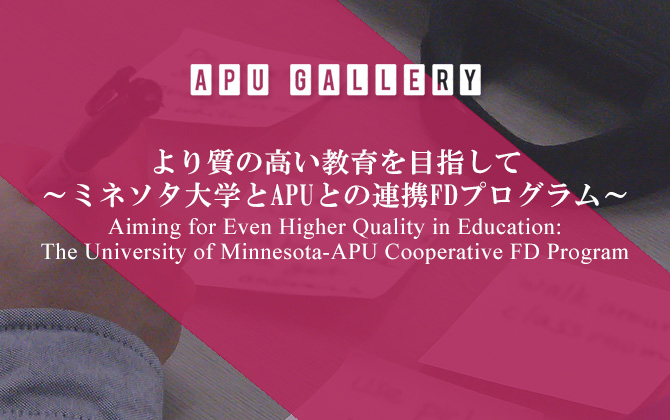
APU is equipped with a formidable multinational and multicultural environment that we utilize to maximize student learning and encourage peer learning. This is what we call "Global Learning." To train our faculty to become better teachers, we have been operating a cooperative faculty development, or FD, program since 2013 in cooperation with the University of Minnesota in the United States. Faculty development programs provide a systematic framework for faculty to improve their teaching content and methods, enhancing the quality of education. Around 20 faculty have participated in this program since its inception.
What is the University of Minnesota-APU Cooperative FD Program?
The University of Minnesota-APU Cooperative FD Program is a faculty training program operated in conjunction with the University of Minnesota, a university renowned for training faculty in multicultural environments. During the program, faculty reflect on their own teaching methods as they learn more effective techniques for designing their courses and making their classes more interactive.
Three Goals of the University of Minnesota Program

To acquire
cutting-edge techniques pertaining to the
assurance of student learning and the
design of curricula and classes.

To learn
methods for putting active learning into
practice, making classes more interactive,
and setting learning goals for students.

To improve
the ability of non-native speakers of English
to use English in the classroom.
Program Schedule
This program runs for an entire year, based on these goals. It features group workshops for the participating faculty members, individual consultations, and feedback sessions with the participants' students. In addition to classroom-style lectures, the participants actively engage in peer learning with each other.
April
The program begins when the participating APU faculty send video recordings of their lectures to the program instructors at the University of Minnesota. The program instructors watch these videos to see how the participants typically teach their classes.
June - July: Phase 1 (University of Minnesota instructors visit APU) APU
Teaching Improvement Workshops
Program instructors from the University of Minnesota visit APU to give a series of workshops. Participants go through the basics of course design and techniques for active learning, after which they think about how they can incorporate these techniques into their own classes. Working together in groups that transcend departmental divisions, they hold discussions and engage in sticky-note brainstorming as they tackle the tasks assigned by the instructors.
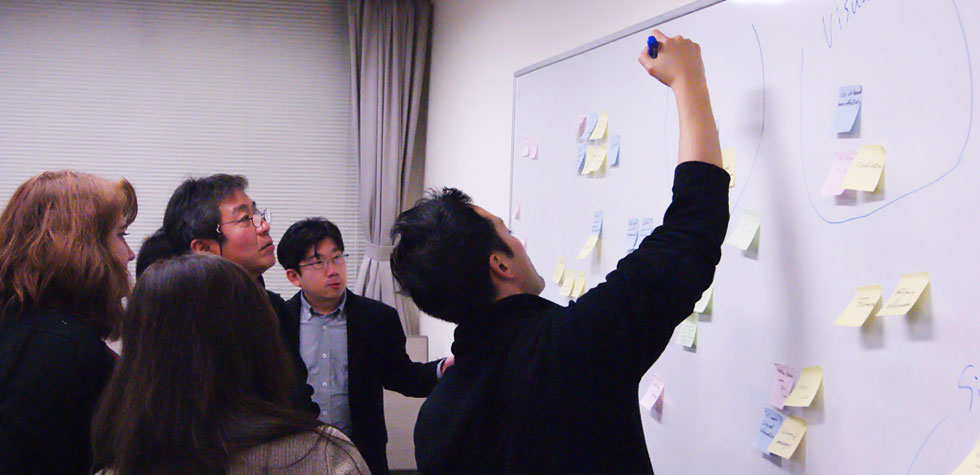
Student Feedback by Consensus
The aim of student feedback by consensus, referred to as SFC, is to provide participants with feedback from the students in their classes. Sessions are held in the last 15 minutes of a normal lecture. The faculty member leaves the room while the instructors from the University of Minnesota conduct the session. Students are put in groups of five to six people to discuss what they think is good about the class and what they think can be improved. At the end of the discussion, each group presents their opinions to the other students. The entire class then comes to a consensus on the good points and areas for improvement.
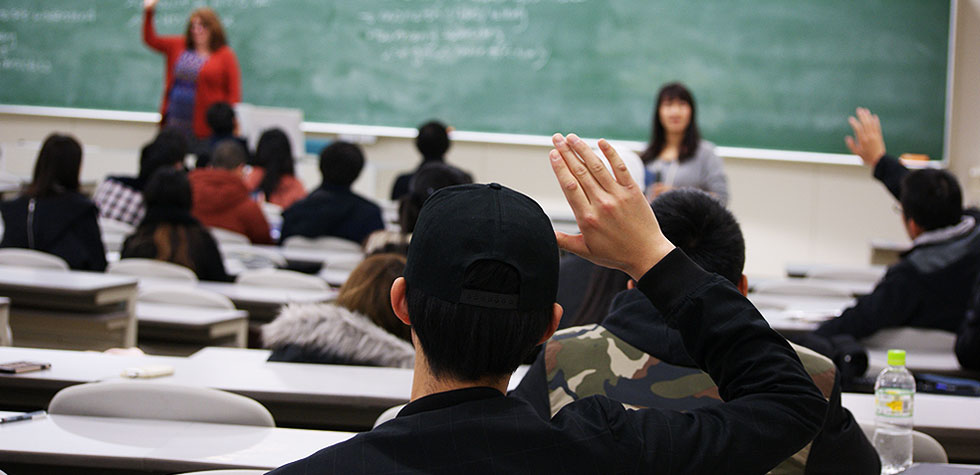
Individual Consultations
In this part of the program, the University of Minnesota instructors hold one-on-one consultations with the program participants. Based on the instructors' impressions of the participants' classes and the results of the SFC session, the APU faculty members reflect on their classes while watching a video recording of their class together with the instructors.
September: Phase 2 (Intensive training at the University of Minnesota) University of Minnesota
The program participants fly to the United States to observe lectures and attend teaching workshops at the University of Minnesota. Actual cases from the University of Minnesota are used to provide instruction that enhances the participants' understanding of pedagogy, course design, and teaching methods.
November and December: Phase 3 (Individual consultations via Skype)
During this phase, individual consultations are held online with the University of Minnesota instructors. The participants discuss what they learned on the program, what they think they can put into practice, concrete actions they have taken, and issues they are facing.
January: Phase 4 (Program wrap-up) APU
Instructors from the University of Minnesota visit APU to conduct a second round of student feedback by consensus (SFC). In this phase, the instructors confirm how the participants have changed after having gone through the first round of SFC (Phase 1), participating in the training sessions at the University of Minnesota, and consulting with the instructors. A workshop is held for all program participants during which time they reflect on their year on the program and share the insights they've gained and what they've learned.
On-campus Workshop
A workshop is held on campus to serve as the culmination of the program. Other faculty and staff are invited to watch the program participants give presentations on what they have learned and join in a group discussion. At the workshop held in December 2016, students participated for the first time, and everyone in attendance brought with them a uniquely different perspective as they discussed how the techniques for improving teaching and classroom management can be shared and applied on a university-wide basis and how APU can create its own FD system.

Here are some comments from Professor IGUCHI Yufu from the College of Asia Pacific Studies regarding her experience participating in faculty development in Minnesota.
Participating in this program allowed me to take another look at applying concepts to things like the significance of and the degree of effectiveness entailed in the many different approaches to teaching that I have experimented with up until now. Since my consultations with top lecturers in Minnesota allowed me to get advice right after class, such as "It was great that you asked students, 'Any questions?'", it made me realize I was picking up what I was learning during the training. Also, after observing a "flipped classroom" (where texts are to be read beforehand, and class is dedicated to finding deeper interpretations through discussion and the like) at the University of Minnesota, I thought this was something I'd like to incorporate at APU, so for a certain class I handed out materials beforehand, and then held a simple quiz at the beginning of the next class. During the SFC (student feedback by consensus) session after the class, favorable comments heard from students included, "It was great to be able to see how well I understood". Educators tend to set objectives based on imparting knowledge or eliciting understanding, but – thinking from the grander perspective of how to contribute to the lives and growth of students – I have come to realize the importance of lesson design. With this experience as inspiration, I hope to conduct classes that will remain with students even after 10 years.
We will continue offering faculty training programs like these in an effort to continuously improve the quality of education at APU.








